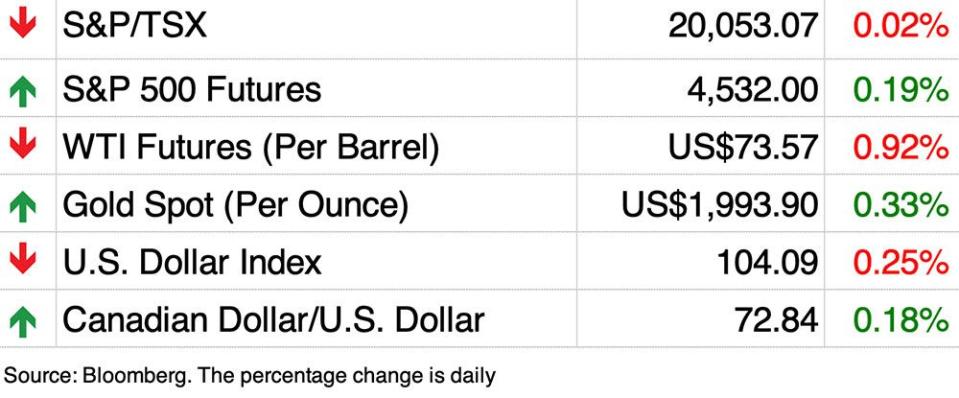Top headlines: Open AI CEO Sam Altman ousted by board for not being 'candid'

Today’s top headlines
Canada says India trade talks on hold to let murder probe unfold
Carbon-capture firm deep sky gets $55 million of new capital
Rogers Sugar strike taking some of the sweetness out of holiday season for bakers
5:16 p.m.
Here are the top 3 performers on the TSX this week

Fotuna Silver Mines Inc. ($16.80, 17.96 per cent)
Shares of Fortuna have continued to rise ever since the Vancouver-based miner reported sales Nov. 8 that beat earnings estimates. On Friday, BMO Capital Markets initiated coverage of the stock with an outperform recommendation based on strong cash flows. Analysts have two buys, three holds and no sells on the stock and a 12-month price target of $5.77, according to Bloomberg.
Interfor Corp. ($9.44, 17.41 per cent)
Shares of the lumber company have rebounded 30 per cent from their 2023 low late last month. On Nov. 8, the Vancouver-based company announced it would buy back up to 5.1 million shares by Nov. 12. For 2023, shares are up six per cent. Analysts have five buys, no holds and no sells on the stock and a 12-month price target of $28.20, according to Bloomberg.
Dye & Durham Ltd. ($2.49, 14.17 per cent)
Shares of the legal software provider jumped after it announced it was launching a strategic review and contemplating the sale of “non-core” assets to help lower debt levels that have caused investors to push Dye & Durham’s stock down 26 per cent this year. More recently, the Toronto-based company shares jumped 59 per cent from their year-to-date low on Oct. 26. Analysts have six buys, no holds and one sell on the stock and a 12-month price target of $23.00, according to Bloomberg.
Gigi Suhanic, Financial Post
4:46 p.m.
Market close: Energy helps TSX gain more than 100 points as U.S. markets muted

Strength in energy stocks helped lead the way higher for Canada’s main stock index, while markets in the U.S. were muted.
The S&P/TSX composite index closed up 122.70 points at 20,175.77.
In New York, the Dow Jones industrial average was up 1.81 points at 34,947.28. The S&P 500 index was up 5.78 points at 4,514.02, while the Nasdaq composite was up 11.81 points at 14,125.48.
The Canadian dollar traded for 72.88 cents U.S. compared with 72.73 cents U.S. on Thursday.
The January crude contract was up US$2.95 at US$76.04 per barrel and the December natural gas contract was down 10 cents at US$2.96 per mmBTU.
The December gold contract was down US$2.60 at US$1,984.70 an ounce and the December copper contract was up four cents at US$3.74 a pound.
The Canadian Press
4:14 p.m.
Open AI CEO Sam Altman ousted by board for not being ‘candid’
Sam Altman has left pioneering artificial intelligence giant Open AI Inc. after the board of directors lost confidence in his ability to lead the company, best-known for the ChatGPT chatbot.
“Mr. Altman’s departure follows a deliberative review process by the board, which concluded that he was not consistently candid in his communications with the board, hindering its ability to exercise its responsibilities,” the company said in a statement. “The board no longer has confidence in his ability to continue leading OpenAI.”
The company said that Mira Murati, the company’s chief technology officer, will take over immediately as interim chief executive. Murati was born in Albania and educated in Canada, before moving on to the United States. Find out more.
Financial Post staff
3:44 p.m.
Rogers turns on wireless service for its customers at remaining TTC subway stations

Rogers Communications Inc. says it has turned on wireless service for its customers at all Toronto subway stations, plus the tunnels between Sheppard West and Vaughan Metropolitan Centre stations.
The move comes as the company continues to build 5G infrastructure for the entire network of subway tunnels — a process it initially said it expected to take two years when it announced plans in April.
Last month, customers of rival carriers Bell Canada and Telus Corp. obtained access to cellular service in the busiest sections of the Toronto subway system after Rogers first activated the upgraded network in downtown stations and tunnels for its own customers.
The service for all carriers followed months of tense back-and-forth negotiations between Rogers, Bell and Telus, prompting the federal government to set a deadline for all Toronto subway system passengers to have cellular connectivity.
Rogers did not say in its announcement when Bell and Telus customers could expect to have service throughout the rest of the activated network.
The companies face a Dec. 20 deadline to negotiate commercial agreements to provide service on the subway over the long term.
The Canadian Press
2:14 p.m.
National Bank of Canada among creditors in meltdown of troubled hedge fund

The court-appointed receiver in the Traynor Ridge Capital Inc. case named new potential creditors, indicating that National Bank of Canada and JonesTrading Canada Inc. also have money caught up in the meltdown of the troubled hedge fund.
The Ontario Securities Commission is investigating the fund after the sudden death of its founder, Chris Callahan, last month. The regulator temporarily banned Traynor Ridge from trading after it said three brokerage firms have potential losses totalling about $85 million to $95 million on trades they did for the hedge fund.
Echelon Wealth Partners Inc. and market maker Virtu Financial Inc. have already disclosed that they were caught with unsettled trading positions from doing business with Traynor Ridge. Both were included in a list of potential creditors posted this week by Ernst & Young Inc., which was named as receiver and manager of all of Traynor’s assets in early November.
The list also included JonesTrading Canada Inc. and National Bank of Canada, with their potential claim amounts against the assets of Traynor Ridge marked as “TBD,” or to be determined. Other creditors also could be identified, according to the filing.
Toronto-based JonesTrading works with traditional asset managers and hedge funds, according to its website, and Montreal-based National Bank is Canada’s sixth-largest lender. Neither company immediately responded to requests for comment Friday.
Bloomberg
1:22 p.m.
CPKC says it’s unshaken by Mexican president’s decree to host passenger rail service

Canadian Pacific Kansas City Ltd. says it’s untroubled by a draft decree from Mexico’s president that would require freight railways to allow passenger service on their tracks.
The Calgary-based railway says the decree, expected to take effect on Nov. 20, stresses that freight rail service will be respected and that it does not anticipate any adverse impact on its network — the only one to stretch from Canada through to the United States and Mexico.
President Andres Manuel Lopez Obrador denied any notion that his decree to be issued later this month amounted to expropriation of private property. He said existing law guarantees passenger trains priority.
Still, almost no regular passenger service remains in Mexico following a 1995 reform that gave concessions to two private railway companies: Mexico’s Ferromex and a subsidiary of U.S.-based Kansas City Southern, which Canadian Pacific acquired in April.
CPKC says it has reached a deal with the Mexican government to carry out a study around passenger trains on a roughly 200-kilometre corridor running northwest from Mexico City.
The draft decree also proposes passenger rail service on another, much longer leg of CPKC-run track between Laredo, Texas, and San Luis Potosi in central Mexico.
The Canadian Press
12:20 p.m.
Midday markets: TSX up more than 100 points in late-morning trading

Strength in the energy and base metal stocks helped Canada’s main stock index rise more than 100 points in late-morning trading, while U.S. stock markets edged lower.
The S&P/TSX composite index was up 127.24 points at 20,180.31.
In New York, the Dow Jones industrial average was down 21.19 points at 34,924.28. The S&P 500 index was down 2.65 points at 4,505.59, while the Nasdaq composite was down 30.03 points at 14,083.64.
The Canadian dollar traded for 72.86 cents U.S. compared with 72.73 cents U.S. on Thursday.
The January crude contract was up US$1.99 at US$75.08 per barrel and the December natural gas contract was down 13 cents at US$2.94 per mmBTU.
The December gold contract was down US$1.40 at US$1,985.90 an ounce and the December copper contract was up two cents at US$3.72 a pound.
The Canadian Press
11:40 a.m.
Mortgage growth in Canada hasn’t been this weak since 2001

Mortgage growth in Canada is the slowest it’s been in more than two decades as higher borrowing costs and elevated prices for homes and apartments weigh on real estate activity.
Residential mortgage credit rose just 3.2 per cent from a year earlier, reaching $2.14 trillion in September, the weakest annual rate of growth since 2001, according to data released Friday by Statistics Canada.
That’s down from as high as 10.9 per cent at the beginning of 2022, marking one of the fastest decelerations in credit growth in data going back to the early 1990s.
The report confirms that the Bank of Canada’s aggressive rate hikes are working to cool household borrowing, restricting their ability to spend and to finance property purchases, as policymakers seek to temper inflation. In the spring of 2001, the central bank’s benchmark overnight rate was around the five per cent mark, as it is now.
The data match the slowdown being seen at real estate offices throughout the country. Elevated borrowing costs are a major reason why homes haven’t been this unaffordable since the early 1990s, when Canada had double-digit interest rates.
The balances of home equity lines of credit, a product that allows consumers to borrow against the difference between their mortgage balance and the value of their home, fell to $165.8 billion in September, down 3.4 per cent from a year earlier.
Canadians have the highest household debt among the Group of Seven countries, a big reason most economists view its economy as more sensitive to higher interest rates than the United States. Most economists expect the Bank of Canada to begin cutting rates in the second quarter of next year, and traders in the swaps market are betting that policymakers will lower the policy rate by June.
Bloomberg
10:40 a.m.
Amazon cutting hundreds of jobs in Alexa unit in U.S., Canada and other countries
Amazon.com Inc. is cutting hundreds of employees in the division responsible for its voice-activated Alexa assistant, according to a memo sent to employees on Friday.
Daniel Rausch, an Amazon vice-president who leads teams working on Alexa and the company’s Fire TV streaming franchise, said the company was “shifting some of our efforts to better align with our business priorities,” including focusing on building capabilities powered by generative artificial intelligence. “These shifts are leading us to discontinue some initiatives, which is resulting in several hundred roles being eliminated.”
Rausch didn’t specify which initiatives would be eliminated.
The Alexa voice assistant powers millions of Echo smart speakers and other devices in homes, but Amazon has struggled to broaden the utility of the software beyond relatively basic tasks such as checking the weather and playing music. The rise of seemingly more capable conversational tools including ChatGPT, powered by so-called generative AI, have highlighted the shortcomings of Amazon’s software. Teams at the company are racing to infuse Alexa with more of those capabilities.
The shares rose about one per cent at 10:07 a.m. in New York.
Amazon, which avoided mass job cuts for most of its existence, began its largest-ever layoffs about a year ago, ultimately axing 27,000 corporate positions after a hiring spree during the pandemic left the company with too many people. The company deepened the layoffs when it announced another 9,000 layoffs in March, which chief executive Andy Jassy said would land on the cloud services division, human resources, advertising and the Twitch livestreaming service.
Since then, the company has continued to look for cost cuts, at times leading to more layoffs. Amazon recently eliminated jobs in its music division and video games unit, and shuttered its physical clothing stores.
Rausch said employees in the U.S. and Canada set to be laid off would be informed Friday morning Seattle time. Employees in India will find out next week, and cuts in other countries may follow other timelines to allow for consultations with employee groups or other factors.
The technology news site GeekWire reported the job cuts earlier.
Bloomberg
10:21 a.m.
Markets open: S&P 500 headed for longest streak of weekly gains since July

Stocks fluctuated, with an options event potentially amplifying market volatility after a torrid rally driven by bets the United States Federal Reserve will end its hiking cycle to prevent a recession.
The S&P 500 was little changed, while still heading toward its longest streak of weekly gains since July. Piles of derivatives contracts tied to stocks and indexes will mature Friday — compelling traders to roll over their existing positions or start new ones.
The equity market’s recent low has been followed by an “epic risk rally,” said Bank of America Corp.’s Michael Hartnett, adding that investors should “fade it” as technical and macroeconomic headwinds are building.
Ten-year yields hovered near 4.4 per cent. The U.S. dollar fell. Oil rebounded after sinking into a bear market.
Traders also kept a close eye on the latest Fedspeak. Fed Bank of San Francisco president Mary Daly said policymakers aren’t certain inflation is on a path to their two per cent target. An increase in labour force participation can ease imbalances between demand and supply and allow for strong growth that doesn’t necessarily fuel inflation, Fed Bank of Boston president Susan Collins noted.
On Wall Street, the S&P 500 was up 0.48 per cent at 20,145.84. The Dow Jones Industrial Average was down 0.02 per cent at 34,933.03 while the Nasdaq composite fell 0.11 per cent to 14,097.70.
In Toronto, the S&P/TSX composite index was up 0.45 per cent at 20,144.12.
Bloomberg
9:30 a.m.
Fairfax Financial offers to take agritech Farmers Edge private at 99 per cent below IPO price

Canadian financial group Fairfax Financial Holdings Ltd. offered to buy out minority shareholders of agriculture technology firm Farmers Edge Inc. at a price that would crystallize near-total losses for any longer-term holders of the stock.
Fairfax’s takeover bid of 25 cents a share is almost 99 per cent below the $17 a share at which Farmers Edge offered stock in a March 2021 initial public offering.
Farmers Edge uses technology to analyze weather, soil moisture, satellite data and other information to help farmers plan crops. The IPO happened in an environment when ultra-low interest rates had opened public markets to speculative ventures; the Winnipeg, Manitoba-based company briefly enjoyed a stock market value of about $835 million.
But its growth plans never came to fruition and, in fact, the business has been shrinking, reporting just $4.4 million in revenue in the third quarter. It has been consistently burning cash.
Fairfax, a Toronto-based investment and insurance company, already owns 61.4 per cent of Farmers Edge. Fairfax has been helping to keep the company afloat by extending a credit line.
Takeover discussions are at a preliminary stage and no decision has been made on a potential transaction, Farmers Edge said in a statement Thursday night. The thinly traded shares closed Thursday at 10 cents.
It’s the second time this week a Canadian technology company that went public in 2021 attracted a takeover bid far below its IPO price. Q4 Inc. agreed to a $6.05-per-share cash takeover from Sumeru Equity Partners. It went public at $12.
Bloomberg
7:30 a.m.
Sugar factory strike puts squeeze on holiday baking
Small businesses across western Canada that depend on sugar are struggling with shortages and higher costs as labour action at one of the country’s few sugar processing facilities stretches into a seventh week.
According to the Canadian Sugar Institute, Canada produces approximately 1.2 million tonnes of refined sugar annually — around 94 per cent of which is refined from raw cane sugar imported in bulk to three refining operations in Vancouver, Toronto and Montreal.
The Toronto refinery is owned by Redpath Sugar, while the Vancouver and Montreal refineries are operated by Rogers Sugar Inc., which markets its products under the brand names Rogers and Lantic.
The sugar supply issues being experienced in Western Canada stem from the Vancouver refinery, where 138 striking workers have been off the job since Sept. 28.
Adrian Soldera, president of Public and Private Workers of Canada Local 8, said the union is at odds with Rogers Sugar over issues like wages, benefits and the company’s proposal to increase refinery operations to 24 hours a day, 365 days per year.
Soldera said he’s aware the strike is impacting customers — even at the grocery store level, where customers are experiencing sporadic shortages just as demand from home bakers begins to spike.
“I mean, this must be the highest sugar demand time of the year,” Soldera said, adding he does not know when the strike will end as the union and employer positions remain far apart.
“Even if we went back tomorrow, the sugar won’t really be hitting the shelves in full capacity until the first or second week of December.”
Amanda Stephenson, The Canadian Press
Stock markets before the opening bell

Stocks are back in the game and bond yields are dropping today as new signs that the economy is slowing have investors betting on interest rate cuts next year.
European stocks are up and U.S. futures are climbing.
This week’s soft inflation reading and jobs data in the United States has fuelled the conviction that aggressive policy-tightening cycles from the Federal Reserve and other central banks are finally at an end.
That view helped drive US$23.5 billion into stock funds in the week through Nov. 15, the second-biggest inflow of the year, says Bank of America Corp.
There are also signs that rate hikes are finally crimping economic growth and company earnings. Oil prices dropped into a bear market, down 20 per cent from their September highs. And the chief executive of Walmart Inc., the world’s largest retailer, said yesterday he sees potential for deflation.
Yesterday, Canada’s main index lost a handful of points, weighed down by weakness in energy and base metal stocks, while U.S. markets were mixed. Find the top three stocks on the TSX here.
Bloomberg
What to watch today
Prime Minister Justin Trudeau is at the Asia-Pacific Economic Cooperation meeting in San Francisco
In Canada, there will be more news on housing with the release of Teranet-National Bank Housing Price Index.
Canada will also get data updates on industrial product and raw materials prices and international securities transactions.
The parliamentary budget officer will post two reports to the agency’s web site, one costing out support for electric-vehicle battery manufacturing and the other on the cost of pausing the carbon tax on heating oil in the Atlantic provinces.
Need a refresher on yesterday’s top headlines? Get caught up here.
Additional reporting by The Canadian Press, Associated Press and Bloomberg

 Yahoo Finance
Yahoo Finance 